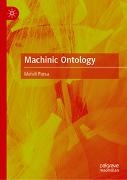Read more
This book considers the becoming-concept of the machine-metaphor. It explores the intersections between this becoming and the development of the concepts of life, organism, and technics. It seeks to introduce universal machinism as a metaphysical foundation with specific ethical and political implications. A machinic ontology proposes that the whole has no inside, the body has no head, a society needs no leader, and the brain has no center. While undoubtedly a Deleuzoguattarian idea, this book endeavors to explore its origins and echoes across various thinkers and domains. In this context, it examines and analyzes the concepts of monstrous machine, transindividual machine, plastic machine, abstract machine and biopolitical machine as they appear in the works of George Canguilhem, Gilbert Simondon, Catherine Malabou, Gilles Deleuze and Félix Guattari, Michel Foucault, and Giorgio Agamben.
Machinic Ontology is essential reading for all scholars and researchers in metaphysics especially those interested in the nature of living and non-living entities and natural systems.
Mehdi Parsa holds a PhD in philosophy from the University of Bonn and is the author of A Reading of Gilles Deleuze’s Logic of Sense which was published by Palgrave Macmillan in 2022.
List of contents
Chapter 1: Introduction.- Chapter 2: George Canguilhem and the Monstrous Machine.- Chapter 3: Gilbert Simondon and the Transindividual Machine.- Chapter 4: Catherine Malabou and the Plastic Machine.- Chapter 5: Gilles Deleuze and Félix Guattari and the Abstract Machine.- Chapter 6: From Bio-Machines to Bio-Politics.- Chapter 7: Conclusion: Dream-Machines.
About the author
Mehdi Parsa holds a PhD in philosophy from the University of Bonn and is the author of A Reading of Gilles Deleuze’s Logic of Sense which was published by Palgrave Macmillan in 2022.
Summary
This book considers the becoming-concept of the machine-metaphor. It explores the intersections between this becoming and the development of the concepts of life, organism, and technics. It seeks to introduce universal machinism as a metaphysical foundation with specific ethical and political implications. A machinic ontology proposes that the whole has no inside, the body has no head, a society needs no leader, and the brain has no center. While undoubtedly a Deleuzoguattarian idea, this book endeavors to explore its origins and echoes across various thinkers and domains. In this context, it examines and analyzes the concepts of monstrous machine, transindividual machine, plastic machine, abstract machine and biopolitical machine as they appear in the works of George Canguilhem, Gilbert Simondon, Catherine Malabou, Gilles Deleuze and Félix Guattari, Michel Foucault, and Giorgio Agamben.
Machinic Ontology is essential reading for all scholars and researchers in metaphysics especially those interested in the nature of living and non-living entities and natural systems.

